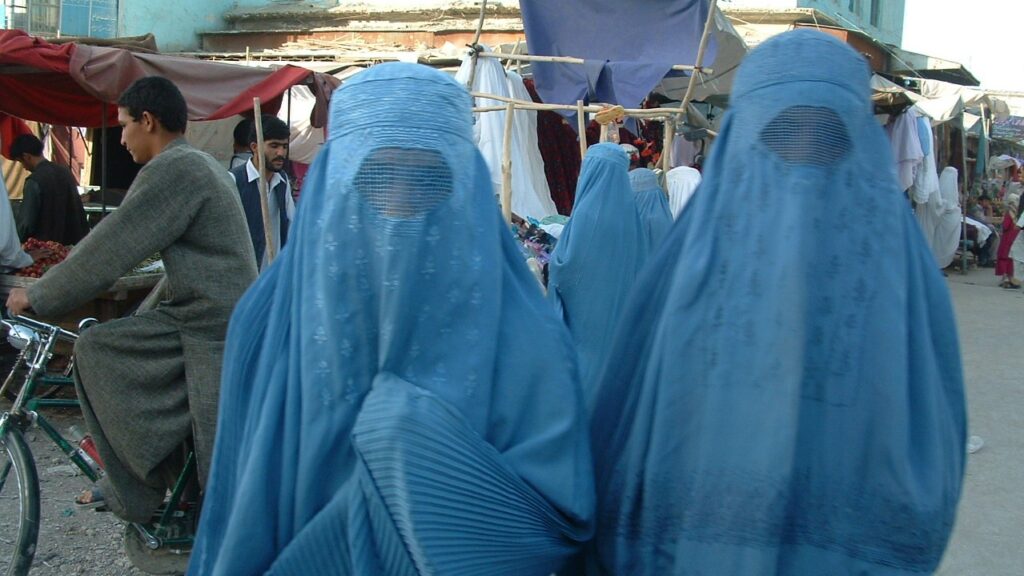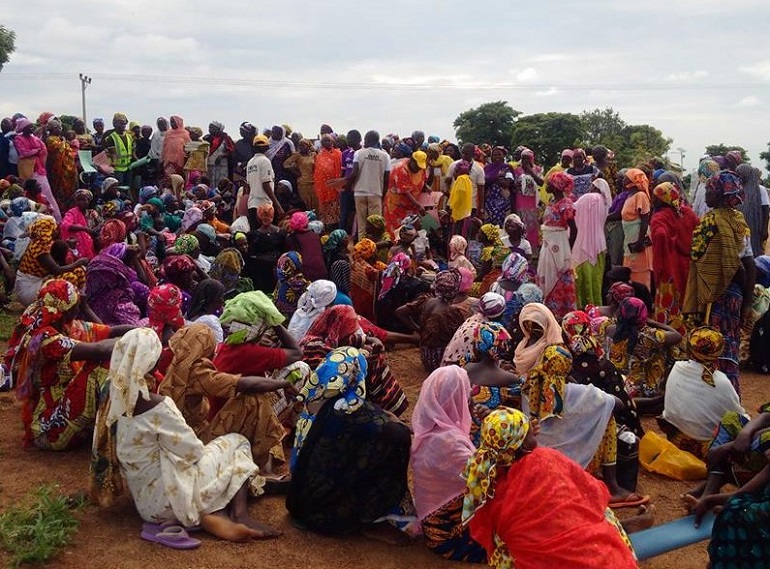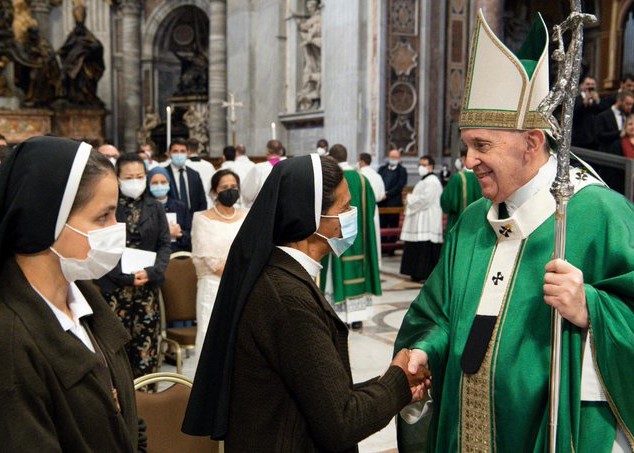Source: www.worldwatchmonitor.org
Date: January 19, 2022
 https://www.worldwatchmonitor.org/wp-content/uploads/2022/01/Afghan-women-in-burqas--300x169.jpg 300w, https://www.worldwatchmonitor.org/wp-content/uploads/2022/01/Afghan-women-in-burqas--768x432.jpg 768w, https://www.worldwatchmonitor.org/wp-content/uploads/2022/01/Afghan-women-in-burqas--98x55.jpg 98w, https://www.worldwatchmonitor.org/wp-content/uploads/2022/01/Afghan-women-in-burqas--800x450.jpg 800w, https://www.worldwatchmonitor.org/wp-content/uploads/2022/01/Afghan-women-in-burqas-.jpg 1279w" alt="Afghan women face highly restricted lives under the Taliban " width="770" height="433" class="wp-image-38895 size-large entered lazyloaded" data-lazy-srcset="https://www.worldwatchmonitor.org/wp-content/uploads/2022/01/Afghan-women-in-burqas--1024x576.jpg 1024w, https://www.worldwatchmonitor.org/wp-content/uploads/2022/01/Afghan-women-in-burqas--300x169.jpg 300w, https://www.worldwatchmonitor.org/wp-content/uploads/2022/01/Afghan-women-in-burqas--768x432.jpg 768w, https://www.worldwatchmonitor.org/wp-content/uploads/2022/01/Afghan-women-in-burqas--98x55.jpg 98w, https://www.worldwatchmonitor.org/wp-content/uploads/2022/01/Afghan-women-in-burqas--800x450.jpg 800w, https://www.worldwatchmonitor.org/wp-content/uploads/2022/01/Afghan-women-in-burqas-.jpg 1279w" data-lazy-sizes="(max-width: 770px) 100vw, 770px" data-lazy-src="https://www.worldwatchmonitor.org/wp-content/uploads/2022/01/Afghan-women-in-burqas--1024x576.jpg" data-ll-status="loaded" />
https://www.worldwatchmonitor.org/wp-content/uploads/2022/01/Afghan-women-in-burqas--300x169.jpg 300w, https://www.worldwatchmonitor.org/wp-content/uploads/2022/01/Afghan-women-in-burqas--768x432.jpg 768w, https://www.worldwatchmonitor.org/wp-content/uploads/2022/01/Afghan-women-in-burqas--98x55.jpg 98w, https://www.worldwatchmonitor.org/wp-content/uploads/2022/01/Afghan-women-in-burqas--800x450.jpg 800w, https://www.worldwatchmonitor.org/wp-content/uploads/2022/01/Afghan-women-in-burqas-.jpg 1279w" alt="Afghan women face highly restricted lives under the Taliban " width="770" height="433" class="wp-image-38895 size-large entered lazyloaded" data-lazy-srcset="https://www.worldwatchmonitor.org/wp-content/uploads/2022/01/Afghan-women-in-burqas--1024x576.jpg 1024w, https://www.worldwatchmonitor.org/wp-content/uploads/2022/01/Afghan-women-in-burqas--300x169.jpg 300w, https://www.worldwatchmonitor.org/wp-content/uploads/2022/01/Afghan-women-in-burqas--768x432.jpg 768w, https://www.worldwatchmonitor.org/wp-content/uploads/2022/01/Afghan-women-in-burqas--98x55.jpg 98w, https://www.worldwatchmonitor.org/wp-content/uploads/2022/01/Afghan-women-in-burqas--800x450.jpg 800w, https://www.worldwatchmonitor.org/wp-content/uploads/2022/01/Afghan-women-in-burqas-.jpg 1279w" data-lazy-sizes="(max-width: 770px) 100vw, 770px" data-lazy-src="https://www.worldwatchmonitor.org/wp-content/uploads/2022/01/Afghan-women-in-burqas--1024x576.jpg" data-ll-status="loaded" />After the August 2021 takeover by the Taliban of Afghanistan, the country has overtaken North Korea as the most dangerous place in the world to be a Christian, according to the annual World Watch List of the NGO Open Doors International, out today.
After 20 years at the top*, North Korea – at no. 2 on the list – faces a crisis of widespread hunger among its population, as does Afghanistan, compounding likely persecution.
The NGO said persecution rose there too during the time covered by the research*.
The reason Afghanistan is ‘worse’ than North Korea is that anyone born in the Islamic Republic who then leaves Islam commits apostasy, for which the penalty under Sharia law is death.
Anyone found to be a Christian in North Korea is highly likely to be sent to a hard labour camp – and their family will also suffer for their member’s faith – but they do not face immediate death, though they can experience that at the hands of the authorities, directly or indirectly.
The other countries in the top 10 are all the same as last year. Several remain unchanged – Somalia at no. 3, Libya no. 4, Eritrea at no. 6 and, notably, India at no.10 (due to the rising tide of extreme Hindutva nationalism).
Yemen moved up to no. 5 (7 last year) while Nigeria rose to 7 from 9. Pakistan goes down from 5 to 8, while Iran drops from 8 to 9.
The List, by recording levels of discrimination across the globe*, estimates that over 360 million Christians suffer high, very high or extreme levels of persecution and discrimination for their faith – it says that’s a rise of 20 million from last year. Its surveys and questionnaires enable analysis of some key trends affecting the global Church under pressure for its faith amidst the coronavirus pandemic and other geopolitical impacts, as outlined here.
Taliban takeover boosts jihadists’ belief in eventual success – globally
The Taliban’s takeover of government in Afghanistan gave jihadists globally a profound psychological boost, not least across Asia. In neighboring Pakistan, the Taliban there strengthened as Islamist groups celebrated. Others may get bolder; Indonesia’s Jemaah Islamiyah[1], which carried out the 2002 Bali bombings, has ties to the Taliban.
Across Africa, jihadists frequently operate in countries which suffer from a corrupt and weak government and administration; they now see it as a matter of time before the foreign forces supporting the fight against them leave. One example is al-Shabaab, which has been fighting the government of Somalia and its allies (the African Union forces) for the past decade. Here, the “underground” Church is already small and scattered, as in Afghanistan.
Sub-Saharan Africa (SSA) continues to see the most violence against Christians. Ranked on that alone, the Democratic Republic of Congo – plagued by the Alliance of Democratic Forces, now openly affiliated to the Islamic State group – and the Central African Republic join Nigeria – which once again scores the maximum points possible – in the top ten for violence. This year, it’s become clear that neither Christians nor other minority groups can count on the security apparatus commanded by the Nigerian Federal Government for their protection. Colleges, schools, churches, villages and community leaders continue to be targeted for kidnappings, killings, injuries and destruction of livestock and livelihoods especially by Fulani militants, as well as known jihadist groups such as Boko Haram and Islamic State West Africa Province (ISWAP).
Mozambique and Cameroon are also in the top 10 for violence, due to jihadists there and across the Lake Chad Basin (Nigeria, Chad, Cameroon and southern Niger) and in the Sahel – (Mali, Burkina Faso and western Niger). Five of these nine Sub-Saharan countries were not even on the WWL in 2014. (Chad is not in the WWL 2022 Top 50, but at no. 63, and is termed a “Persecution Watch Country”).
Global Church increasingly ‘displaced’ or ‘refugee’ – adding to its vulnerabilities
The United Nations High Commissioner for Refugees[2] says about 84 million people were forcibly displaced in 2021, either within their own country, or – for 26 million – across borders. Many of them are Christians fleeing persecution: Hundreds of thousands are affected by Islamist violence (e.g. in the Sahel region) or are fleeing forced conscription (Eritrea), civil conflict (Sudan), state repression (Iran), and/or family oppression due to their faith. The vast majority remain in their region, displaced in-country or as refugees.
In parts of Sub-Saharan Africa (including north-east Kenya), research indicates that the Christian population has simply emptied out and gone. In the past few years, hundreds of churches have been closed in Burkina Faso, Mali, Niger – joined this year by 470 in Nigeria alone. If Christians were to return home, it’s likely violent jihadist attacks would resume.
Once displaced or travelling, they risk extortion, human trafficking, rape and detention, especially if they ever reach Libya.
Christians IDPs and refugees continue to live in Iraq, Syria, Lebanon and Jordan amongst others. If they’re a minority in their countries of origin they can report extra vulnerabilities if they’re in camps: they can experience discrimination by officials (especially if they’ve converted from a Muslim background) and even be denied humanitarian and other practical assistance. This can be true even in Western settings.
Christian women report their leading source of persecution as sexual assault. WWL researchers received reports of women and children subjected to rape, sexual slavery, harassment and more, both in camps and especially while they journeyed in search of safety. Poverty and insecurity compound their vulnerability; some are forced into prostitution to survive.
For these and other reasons, many displaced Christians prefer to avoid camps altogether, meaning they’re never registered as ‘refugees’ and so don’t qualify for food aid, trauma support and so on. Their children may miss out on education, too.
Conflict in Myanmar targets the Christian-majority Chin State and Christian minority populations (e.g. Kachin, Kayah, Shan State); the Burmese military bombed churches and also killed or detained pastors. Research indicates that 200,000 Christians have been displaced and a further 20,000 of them have fled the country during the WWL 2022 reporting period.
Elsewhere, across parts of Sub-Saharan Africa and in parts of Asia, Christians leave their homes and countries reluctantly, having no other way to escape constant discrimination and pressure in the legal, political, economic and social spheres. This steady ‘exodus’ weakens existing churches as youths migrate from countries as different as Nigeria and Malaysia.
 https://www.worldwatchmonitor.org/wp-content/uploads/2018/09/Widows-BH-1-300x222.jpg 300w, https://www.worldwatchmonitor.org/wp-content/uploads/2018/09/Widows-BH-1-768x568.jpg 768w, https://www.worldwatchmonitor.org/wp-content/uploads/2018/09/Widows-BH-1-74x55.jpg 74w, https://www.worldwatchmonitor.org/wp-content/uploads/2018/09/Widows-BH-1-609x450.jpg 609w, https://www.worldwatchmonitor.org/wp-content/uploads/2018/09/Widows-BH-1-541x400.jpg 541w, https://www.worldwatchmonitor.org/wp-content/uploads/2018/09/Widows-BH-1-270x200.jpg 270w" alt="Women and girls continue to be displaced by violence and abduction across northern Nigeria. (Photo: World Watch Monitor)" width="770" height="569" class="wp-image-35418 size-full entered lazyloaded" data-lazy-srcset="https://www.worldwatchmonitor.org/wp-content/uploads/2018/09/Widows-BH-1.jpg 770w, https://www.worldwatchmonitor.org/wp-content/uploads/2018/09/Widows-BH-1-300x222.jpg 300w, https://www.worldwatchmonitor.org/wp-content/uploads/2018/09/Widows-BH-1-768x568.jpg 768w, https://www.worldwatchmonitor.org/wp-content/uploads/2018/09/Widows-BH-1-74x55.jpg 74w, https://www.worldwatchmonitor.org/wp-content/uploads/2018/09/Widows-BH-1-609x450.jpg 609w, https://www.worldwatchmonitor.org/wp-content/uploads/2018/09/Widows-BH-1-541x400.jpg 541w, https://www.worldwatchmonitor.org/wp-content/uploads/2018/09/Widows-BH-1-270x200.jpg 270w" data-lazy-sizes="(max-width: 770px) 100vw, 770px" data-lazy-src="https://www.worldwatchmonitor.org/wp-content/uploads/2018/09/Widows-BH-1.jpg" data-ll-status="loaded" />
https://www.worldwatchmonitor.org/wp-content/uploads/2018/09/Widows-BH-1-300x222.jpg 300w, https://www.worldwatchmonitor.org/wp-content/uploads/2018/09/Widows-BH-1-768x568.jpg 768w, https://www.worldwatchmonitor.org/wp-content/uploads/2018/09/Widows-BH-1-74x55.jpg 74w, https://www.worldwatchmonitor.org/wp-content/uploads/2018/09/Widows-BH-1-609x450.jpg 609w, https://www.worldwatchmonitor.org/wp-content/uploads/2018/09/Widows-BH-1-541x400.jpg 541w, https://www.worldwatchmonitor.org/wp-content/uploads/2018/09/Widows-BH-1-270x200.jpg 270w" alt="Women and girls continue to be displaced by violence and abduction across northern Nigeria. (Photo: World Watch Monitor)" width="770" height="569" class="wp-image-35418 size-full entered lazyloaded" data-lazy-srcset="https://www.worldwatchmonitor.org/wp-content/uploads/2018/09/Widows-BH-1.jpg 770w, https://www.worldwatchmonitor.org/wp-content/uploads/2018/09/Widows-BH-1-300x222.jpg 300w, https://www.worldwatchmonitor.org/wp-content/uploads/2018/09/Widows-BH-1-768x568.jpg 768w, https://www.worldwatchmonitor.org/wp-content/uploads/2018/09/Widows-BH-1-74x55.jpg 74w, https://www.worldwatchmonitor.org/wp-content/uploads/2018/09/Widows-BH-1-609x450.jpg 609w, https://www.worldwatchmonitor.org/wp-content/uploads/2018/09/Widows-BH-1-541x400.jpg 541w, https://www.worldwatchmonitor.org/wp-content/uploads/2018/09/Widows-BH-1-270x200.jpg 270w" data-lazy-sizes="(max-width: 770px) 100vw, 770px" data-lazy-src="https://www.worldwatchmonitor.org/wp-content/uploads/2018/09/Widows-BH-1.jpg" data-ll-status="loaded" />China’s model of centralized control of religion leads the world
As China’s economic prowess and influence grows – with its infrastructural Belt and Road initiative now including a ”digital technology” component – so has Chinese nationalism. This requires social stability, enforced from above with “orders”, rather than by choice, freedom of speech or of other belief systems. Chinese religious leaders realize they must conform. New rules from May 2021 require them to “love the motherland, support the leadership of the Communist Party and the socialist system”. They must not “endanger national security, undermine national unity” or “divide the country.”
Meanwhile, new rules limit the extent of citizens’ contact with foreigners in the country[3].
Under Communist ideology in the Americas, the pandemic continued to be used as a pretext to surveil churches and impose greater restrictions. In Cuba, after mass protests in July, Catholic and Protestant leaders who spoke out for social justice were detained, tortured and fined excessively. In Nicaragua and Venezuela too, ruling parties promoted smear campaigns against Catholic bishops, cancelled registration permits and closed churches.
This model, if not ideology, is emulated recently in countries as diverse as Sri Lanka, Myanmar and Malaysia, joining others such as the Central Asian states, all of which have increased restrictions on dissenters from ‘One country, one people, one religion’.
Minorities continue to suffer discrimination in societies made increasingly suspicious of them, especially by mainstream and social media [see Open Doors’ India report[4]].
Where authoritarianism combines with Islam, Christians suffer. Instability in the MENA region since the Arab Spring of 2011 means that dictatorial measures often continue against the historic and other established and non-traditional churches, as well as against Muslim converts in particular. Algeria, for instance, ordered three more Protestant churches to close this year (to add to 13 others which remain shut).
4. Authoritarian governments and even criminal gangs continue to use COVID restrictions to weaken the Church
China’s swift and draconian response to COVID-19 is well-documented. Where the need for restrictions ended, in some regions many official Three Self churches, as well as un-registered churches, were not permitted to re-open, forcing them into smaller ‘cell groups’ meeting in homes or online. Meantime, reports from counties in Henan and Jiangxi provinces, for example, said surveillance cameras are now in all state-approved religious venues.
At the same time, some Bible apps were banned from online stores. After the arrest of one man for ‘illegal operation’ of an online Christian bookstore, officials began a nationwide investigation[5] into all his customers, including a request for anyone who bought a book by a jailed famous pastor[6] to return it! (
The pandemic appeared to provide ”proof of concept” that surveillance by digital technology worked inside the country sufficiently that it is in demand globally, not least by other authoritarian governments. In Vietnam, for instance, state and non-state actors used COVID-19 outbreaks to slander churches, even to instigate criminal investigations against one church[7].
From West Africa to Central America, government focus on fighting the pandemic continued to enable jihadist and/or organized criminal groups to further consolidate and/or expand their power and territorial control, as the World Watch List reported last year.
 https://www.worldwatchmonitor.org/wp-content/uploads/2021/10/Gloria-meets-Pope-2-1-300x214.jpg 300w, https://www.worldwatchmonitor.org/wp-content/uploads/2021/10/Gloria-meets-Pope-2-1-77x55.jpg 77w, https://www.worldwatchmonitor.org/wp-content/uploads/2021/10/Gloria-meets-Pope-2-1-630x450.jpg 630w" alt="Gloria Argoti meets Pope Francis straight after being freed by Islamists in Mali, Oct 10 2021 (Vatican)" width="634" height="453" class="wp-image-38850 size-full entered lazyloaded" data-lazy-srcset="https://www.worldwatchmonitor.org/wp-content/uploads/2021/10/Gloria-meets-Pope-2-1.jpg 634w, https://www.worldwatchmonitor.org/wp-content/uploads/2021/10/Gloria-meets-Pope-2-1-300x214.jpg 300w, https://www.worldwatchmonitor.org/wp-content/uploads/2021/10/Gloria-meets-Pope-2-1-77x55.jpg 77w, https://www.worldwatchmonitor.org/wp-content/uploads/2021/10/Gloria-meets-Pope-2-1-630x450.jpg 630w" data-lazy-sizes="(max-width: 634px) 100vw, 634px" data-lazy-src="https://www.worldwatchmonitor.org/wp-content/uploads/2021/10/Gloria-meets-Pope-2-1.jpg" data-ll-status="loaded" />
https://www.worldwatchmonitor.org/wp-content/uploads/2021/10/Gloria-meets-Pope-2-1-300x214.jpg 300w, https://www.worldwatchmonitor.org/wp-content/uploads/2021/10/Gloria-meets-Pope-2-1-77x55.jpg 77w, https://www.worldwatchmonitor.org/wp-content/uploads/2021/10/Gloria-meets-Pope-2-1-630x450.jpg 630w" alt="Gloria Argoti meets Pope Francis straight after being freed by Islamists in Mali, Oct 10 2021 (Vatican)" width="634" height="453" class="wp-image-38850 size-full entered lazyloaded" data-lazy-srcset="https://www.worldwatchmonitor.org/wp-content/uploads/2021/10/Gloria-meets-Pope-2-1.jpg 634w, https://www.worldwatchmonitor.org/wp-content/uploads/2021/10/Gloria-meets-Pope-2-1-300x214.jpg 300w, https://www.worldwatchmonitor.org/wp-content/uploads/2021/10/Gloria-meets-Pope-2-1-77x55.jpg 77w, https://www.worldwatchmonitor.org/wp-content/uploads/2021/10/Gloria-meets-Pope-2-1-630x450.jpg 630w" data-lazy-sizes="(max-width: 634px) 100vw, 634px" data-lazy-src="https://www.worldwatchmonitor.org/wp-content/uploads/2021/10/Gloria-meets-Pope-2-1.jpg" data-ll-status="loaded" />5. Any good news at all?
The Pope’s visit to Iraq’s region desecrated by Islamic State was generally seen as a success, despite fears it could cause a COVID outbreak; it encouraged more Christians to consider returning to rebuild.
A Colombian Catholic nun, Gloria Argoti, was freed by Islamist militants in Mali (Oct 2021) after nearly five years’ captivity. She said her faith had helped her to survive the ordeal.
*The first annual WWL was recorded in January 1993. Countries’ overall scores are an amalgamation of six different scores: for violence levels, along with persecution in private life, family life, community life, civic life and of church communities. This year’s list covers the period 1 Oct 2020 – 30 Sept 2021.
[1] https://www.benarnews.org/english/commentaries/asean-security-watch/taliban-abuza-08162021185452.html
[2] https://www.unhcr.org/refugee-statistics/
[3] China mulls new rules on foreigners to ‘prohibit religious extremism’ – CNN
[4] https://media.opendoorsuk.org/document/pdf/Destructive%20Lies-Full%20version-DIGITAL-ODUK-2021.pdf
[5] https://www.csw.org.uk/2021/11/24/press/5489/article.htm
[6] Pastor Wang Yi, of Early Rain Church, Chengdu
[7] https://www.iirf.eu/news/other-news/covid-19-leads-to-prosecution-of-house-church-group/
